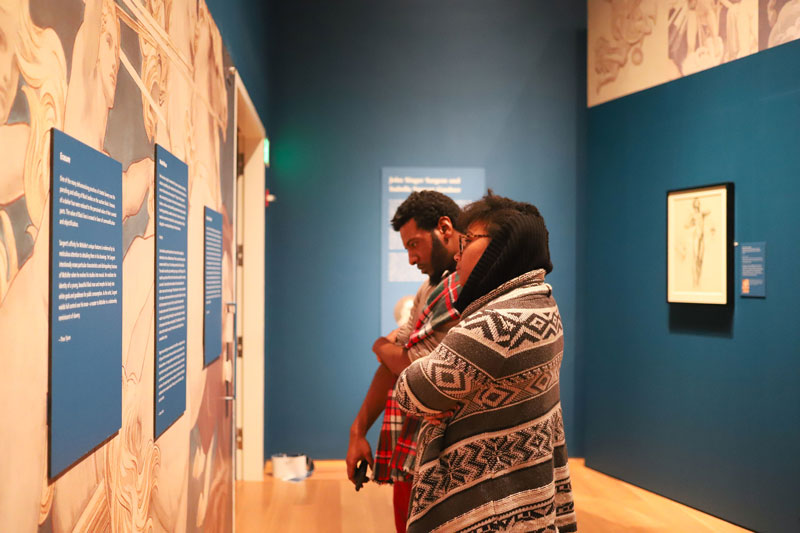Foundation Announces Inaugural Grantees Who Will Collaborate on Anti-Racist Project Models and Practices
The Henry Luce Foundation’s American Art Program has awarded four grants launching its new Museum Partnerships for Social Justice initiative (MPSJ). This effort aims to support art museums as they explore, develop, and ultimately disseminate anti-racist project models and implementation frameworks for use across the field. The goal of the initiative is to recognize, assist, and expand a cohort of organizations committed to instituting anti-racist practices across their museums through art-centered projects.
The Foundation is pleased to announce the inaugural MPSJ grantees: Mississippi Museum of Art; Isabella Stewart Gardner Museum; Weatherspoon Art Museum at UNC Greensboro; and Memphis Brooks Museum of Art. Leaders of the four museums will be in dialogue throughout the 18-month grant period. Pairs of grantee museums will work more closely together, convening staff to discuss project development and sustained engagement with new and diverse community partners.
Mississippi Museum of Art will partner with the Weatherspoon Art Museum, and the Isabella Stewart Gardner Museum will partner with the Memphis Brooks Museum of Art. During the first phase of work, they will examine case studies of recent social justice projects; the second phase will focus on implementing these models in new projects.
“Many of our museum partners are recognizing their accountability to underserved communities of color, and we seek to support them in the necessary work that must follow,” said Terry Carbone, Program Director of the Luce Foundation’s American Art Program. “This new initiative is central to our goal of encouraging museums to present works of art as catalysts for pressing cultural conversations. These grants will allow them to develop new practices and build relationships that will transform their spaces into forums for reconsidering accepted histories, foreground the voices and experiences of underrepresented artists and cultures, and welcome diverse collaborators and communities into dialogue.”
Mississippi and the Weatherspoon will examine and reflect on MMA’s new programs, the Arts and Civil Rights Initiative (ACRI) and the Center for Art and Public Exchange (CAPE). ACRI and CAPE have enabled MMA to advance anti-racist practices throughout its internal and public-facing work by developing skills and capacity for compassion, understanding, and civil discourse. An in-action case study will be provided by MMA’s current work as co-organizer of the nationally touring exhibition A Movement in Every Direction: Legacies of the Great Migration. As the case-study-based dialogue advances, the Weatherspoon will engage UNC Greensboro and diverse local partners in inquiry-based conversations that will inform efforts to reinterpret the museum’s collection of American art and create sustainable bridges to communities.
“The Mississippi Museum of Art is honored to be selected, based on our previous work and strong commitment, for the inaugural class of this innovative grant program,” said MMA Director Betsy Bradley. “We look forward to partnering with the Weatherspoon Art Museum to invest in meaningful community engagement and anti-racist work. This will be a true shared learning experience, as together our two museums build cultures of learning with our communities.” Juliette Bianco, Director of the Weatherspoon Art Museum said, “Our engagement with the Mississippi Museum of Art’s foundational programs and Great Migration exhibition will help us learn how the Weatherspoon can invite diverse stakeholders to re-assess both our holdings of American art and the ways in which we share them. We hope to use community-generated dialogue to better promote access, inclusion, and transformation and inspire investment in our shared future.”
The Isabella Stewart Gardner Museum’s Luce-funded exhibition Boston’s Apollo: Thomas McKeller and John Singer Sargent (2020) exemplified a new, anti-racist approach to curatorial practice. The Museum has since expanded these efforts to engage contemporary artists and diverse community partners in the exploration and presentation of its historic collection. ISGM’s in-action case studies will include forthcoming exhibitions that take up urgent issues of race, representation, gender, and power. Artists Zanele Muholi, Betye Saar, and Titus Kaphar will bring local communities and perspectives into dialogue with ISGM’s storied collections. As the MPSJ dialogue develops, the Memphis Brooks Museum of Art will produce an exhibition and catalog curated by the MBMA’s Joyce Blackmon Curatorial Fellow in African American Art and the Art of the African Diaspora and, in the process, expand and deepen ties with Memphis’ communities of color.
Peggy Fogelman, ISGM’s Norma Jean Calderwood Director, states, “We are honored to participate in the Henry Luce Foundation’s Museum Partnerships for Social Justice. Working in collaboration with colleagues affords all of us the opportunity to challenge assumptions and explore new ways to elevate the voices of our communities through socially-engaged exhibitions and projects.” The Memphis Brooks Museum of Art’s Acting Executive Director, Mark Resnick, adds, “The Brooks’ main focus is making Memphis’ art museum truly of and for this diverse city and region. This unprecedented collaboration with such remarkable partners will help us reach our ambitious DEAI goals faster and, we hope, contribute to systemic change in the field toward equity.”
Sign up for updates
Explore Themes and Ideas































































